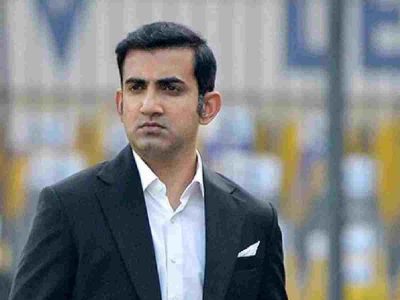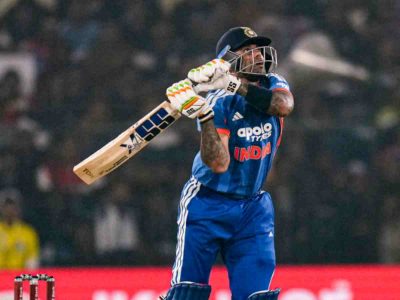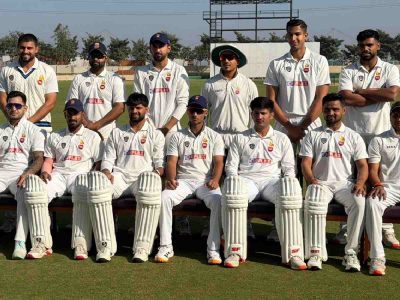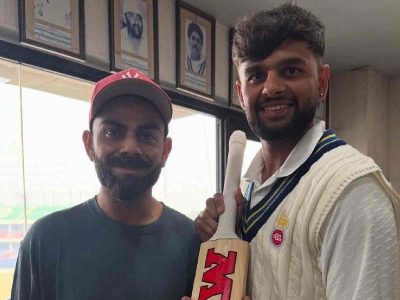THIS YEAR’S WINTER OLYMPICS WITNESSED HISTORIC UNIFIED TEAMS OF SOUTH AND NORTH KOREA. BEIJING USED THE 2008 GAMES TO SHOWCASE ITS POWER, AND RUSSIA’S PUTIN USED SOCHI AS THE CURTAIN RAISER FOR HIS INVASION OF CRIMEA
The Olympics, be it the summer or winter ones, has forever claimed to exist above politics, and transcend it. Yet, for all its posturing over the decades, the event is more often than not used as a pawn in the global geopolitics chessboard. In recent times, Beijing used the 2008 Games to showcase the country’s new power, and era of global domination, and Russia’s Vladimir Putin used Sochi (2014) as the curtain raiser for his invasion of Crimea.
When America’s FBI wanted the late FIFA official, Chuck Blazer, to provide it with evidence for corruption in their investigation into the workings of the association, the agency sent him to the London Olympics, and his key chain was tagged to a recording device. Blazer did manage to record incriminating evidence against several big hitters in international football.
The only people completely excluded from any right to make political statements at an Olympics are, of course, the athletes themselves. They are expected to remain disciplined. If they are not, they are immediately, and uncomfortably, disciplined through harsh sanctions.
However, this glaring, and public, inconsistency of the mega-event never seems to have troubled Thomas Bach. The International Olympic Committee (IOC) president talks about the organisation’s questionably claimed successes, and never its thoroughly-ingrained hypocrisies.
Keeping this in mind, almost everyone knows the forthcoming version of the Pyeongchang Olympics memo. While the superpowers and diplomatic Gods failed to bring about a geopolitical rapprochement, the Winter Olympics succeeded. The event has already been dubbed the ‘Peace Games’, and witnessed a historic handshake between the prime minister of South Korea and the nuclear-laden dictator up north.
But the credit still lies with the diplomats and world leaders. More than the IOC, the South Korean government the credit must be given to American president Donald Trump, and his overblown and regular hyperboles in 140 ‘twitter’ characters (now upgraded, to 280). If anything, the joint mission at Pyeongchang is a sign that the world’s view towards the US’s foreign policy has changed.
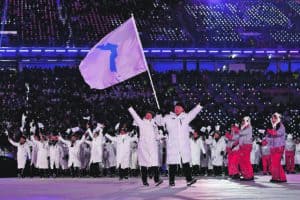
What hasn’t changed is how such political interference interferes with athletic ambition and brilliance. Players work for long periods to achieve name and fame. “It is so rare in an athlete’s life that you get to even compete in an Olympic Games. It’s even rarer to compete in an Olympics in your home country,” American freestyle skier, Tracy Evans, once said.
At the opening ceremony of this Olympic, South Korean athletes and coaches concluded the ‘Parade of Nations’ bearing a flag that wasn’t theirs, even if it represented a dream that it could be. They shared that exceedingly rare moment with athletes and coaches from North Korea, a country which wasn’t involved in the organisation of the event, missed the registration deadline for sending a delegation, and boasted of only two athletes who qualified on merit.
But let’s be objective and factual. We have seen such scenes before. Nine times before, to be precise, the North and South Koreans delegations marched in unison at the previous international athletic competitions. It began with the 2000 Olympics in Australia. Behind the pretty picture, there was the messy story when the North insisted that the South pays for its uniforms, and reduce the number of its participants so as to not overwhelm its.
The North and South repeated the show of solidarity at the 2006 Olympics in Italy, only for North Korea to test its first nuclear weapon eight months later. The two nations did it again at the 2014 Asian Games in South Korea, only for the North and South to exchange fire over the border merely days after the Games.
But of course, what was new this time was the joint effort on the field too. Specifically, on the ice hockey pitch at Pyeongchang, where the two Koreas fielded a combined squad. From the moment this was announced, however, it exposed deep divisions in South Korea. In sporting terminology, people were outraged at perceived unfairness to home-grown players.
The real impact was indirect, on the millennials, who don’t understand this genteel behaviour on the part of the South Korean top brass. “Young people don’t understand a united peninsula,” says Stephen Rausch, an American journalist working with the Korea Herald in Seoul. “They only know North Korea as a country that attacks border islands, ships and threatens Seoul on a regular basis. For them, this olive branch is unacceptable.”
The combined ice hockey women’s team must field at least three North Koreans in each game, out of a total of 22, according to the agreement with the IOC. It presents difficult choices for the Canadian-American coach, Sarah Murray. Should she use players who fought hard for a spot, or those who joined at the last minute because of diplomatic overtures?
To be fair, on and off the field, the diplomacy between te players and sport administrators is literally on the ice. Interactions are limited to meal times. Back at the residential village, they bunk with those from their respective countries. In a 1945 essay, titled “The Sporting Spirit”, writer George Orwell discussed the fierce nationalism aroused by sport.
He wrote, “I do not, of course, suggest that sport is one of the main causes of international rivalry; big-scale sport is itself, I think, merely another effect of the causes that have produced nationalism. Still, you do make things worse by sending forth a team of eleven men, labelled as national champions, to do battle against some rival team, and allowing it to be felt on all sides that whichever nation is defeated will ‘lose face’.”
The two Koreas did the opposite. They decided to join hands, and use the opportunity to perhaps ‘lose face’ and build hope together. Except, this is not a lose-lose situation. The North doesn’t have much to lose. Its delegation arrived like party guests on free passes, who are allowed to drink as much as they want, brawl if they must, and puke it out if they felt like, without fear of reprimand.


